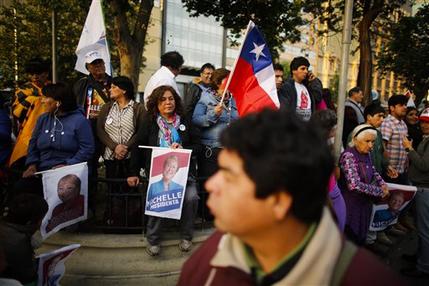SANTIAGO, Chile (AP) — Moderate socialist Michelle Bachelet romped to an easy top finish in the first round of Chile’s presidential election, and heads into a runoff next month as the strong favorite to resume the office after a four-year break.

The highly popular Bachelet is widely expected to win Dec. 15 over her childhood friend and conservative Evelyn Matthei, the No. 2 candidate in Sunday’s nine-person field. But she will face a tough second term.
After years of angry street protests demanding profound changes in Chile’s power structure and a reversal of dictatorship-era policies that foster vast inequality, Bachelet promised in her campaign to deliver reform. But more than half of the voters stayed home Sunday.
It’s very likely that the same ones as usual voted in these elections and the young didn’t vote in great numbers, said Kenneth Bunker, a Chilean doctoral candidate in political science at the London School of Economics.
This shows that although the offers by the candidates had a lot to do with demands of the street, the young didn’t vote for the candidates who proposed what they demanded. Bachelet didn’t win with the vote of the young. She won with the traditional vote.
While the precise balance of Congress remained undetermined Sunday night, Bachelet’s New Majority coalition had the simple majority needed for tax changes, but it clearly didn’t win enough seats to change the electoral system or the dictatorship-era constitution.
The student movement may still prove to have a key role still to play, Bunker said. To push through educational reforms, Bachelet will need 22 senators and 69 deputies and just may have the numbers if she can persuade two student leaders elected to the lower house and an independent senator to join her, he said.
If Bachelet gets this ample majority, she’ll be much stronger in the second round because she’ll be able to promise educational reform,” he said. “If not, she’ll win the presidential elections, but it will be a lot harder for people to like her.
Dictatorship-era rules require voting majorities in Congress of 57 percent for educational reform, 60 percent for electoral reform and nearly 67 percent for constitutional changes.
Bachelet, 62, left office with an 84 percent approval rating after her 2006-10 presidency despite failing then to bring about major changes in society. This time, she has taken up the cause of protesters, vowing to revamp the constitution, raise corporate taxes to 25 percent from 20 percent to fund an education overhaul, and reduce the wealth gap.
A runoff victory for Bachelet looks almost certain with most anti-establishment candidates likely to either abstain or support her in the second round.
Her closest rival, Matthei, got 25 percent of the votes and celebrated getting another try at Bachelet, this time in a one-on-one race.
Matthei, 60, an outspoken former labor minister, says Chile must continue business-friendly policies she credits for fast growth and low unemployment under center-right President Sebastian Pinera. She is against changing the constitution drafted during the dictatorship years and favors funding government programs through improved economic growth, not by raising taxes.
Both candidates have to try to charm a great percentage of the voters in the second round,” said Guillermo Holzmann, a political science professor at the Universidad de Valparaiso. “For Bachelet that means incentivizing voters without moving too far left. For Matthei, it’s making credible that Pinera’s government should have continuity.
Chile is the world’s top copper producer, and its fast-growing economy, low unemployment and stable democracy are the envy of Latin America. But millions of Chileans have taken to the streets in recent years, venting frustration over the huge gap between rich and poor and the country’s chronically underfunded education system.
Student leaders have focused their demands on restoring free, quality public education and have said they can bring about that change through votes after previously devoting most of their energies into street protests.
But student groups have warned that they’ll go back to streets if their demands are not met, and their demands have grown.
Like many other Chileans, students want a new constitution to replace the top-down political system dictated by Gen. Augusto Pinochet’s dictatorship, and popular referendums to give Chileans a direct voice.
“Bachelet is likely to win, Holzmann said. But it’s going to get really hard for her when she becomes president.
—
Associated Press writer Luis Andres Henao reported this story in Santiago and Michael Warren reported from Buenos Aires, Argentina.
—
Luis Henao on Twitter: https://twitter.com/LuisAndresHenao
Michael Warren on Twitter: https://twitter.com/mwarrenap





